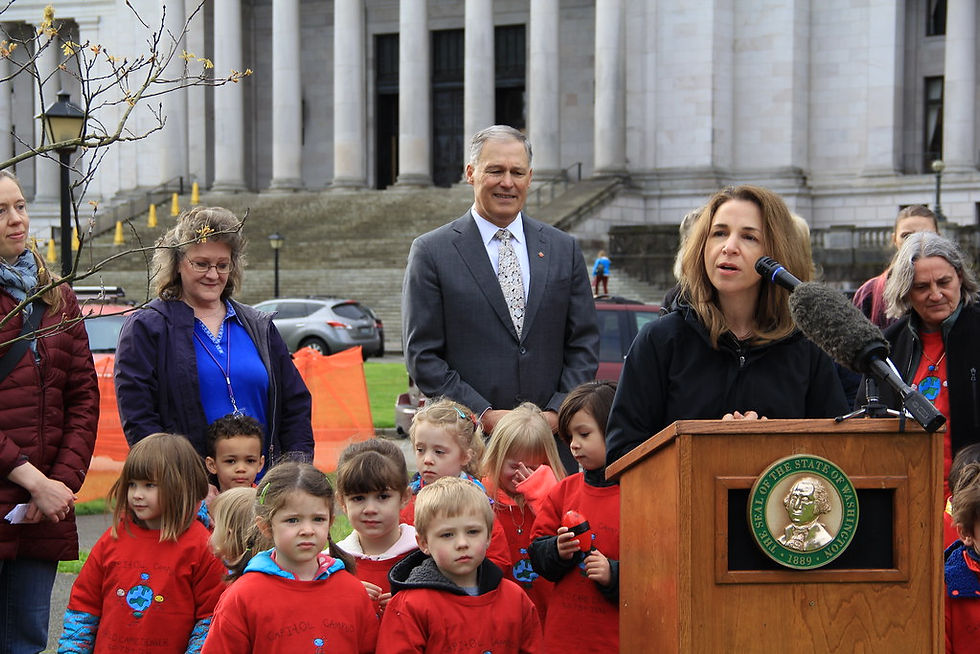The Double Standard: A Reflection
- Emily Wicks
- Jul 10, 2024
- 7 min read

When I received multiple texts referencing Jim Brunner's July 10 Seattle Times article about Hilary Franz, I responded, "Well, we knew this was coming."
As I read the story, I went through thousands of thoughts and feelings.
Let me preface this with my background in politics and government.
I was a deputy fundraiser on Jay Inslee's first gubernatorial campaign in 2012 (when he was still in Congress); I've worked in the Washington State Legislature and on multiple campaigns – everything from school district levies to state legislative races. I even ran my own campaign and served a term in the Washington State Legislature.
And from March 2023 to June 2023, I worked for Hilary Franz's then campaign for Washington State Governor.
Hilary was maddening to work for. She was ultra-focused on her work at DNR, which was good for the government but annoying from a campaign perspective. It shifted her from the minimal and valuable time we had on the campaign trail. As a small campaign team, it took a lot of work to wrangle her in when we needed her to focus strictly on campaigning. I had already done this whole dog and pony show in my 20s and early 30s and had very little patience for candidate attitudes, especially running a department of one. I got out almost as quickly as I got in.
I left on good terms and wished Hilary and the team well.
Why? Because Hilary Franz is no different than any other politician.
One time, Inslee berated me for 20 minutes during his phone calls about how poorly he thought I explained how to leave a recorded message. Apparently, saying, "When you're ready, press four and read this script after the beep," wasn't clear enough. He apologized in an uncomfortable phone conversation after a forceful suggestion from my direct boss.
I worked for a male legislator whom I had to drive and pick up from work every day. During the interim months, I traveled multiple times a day over a tolled road. I took trips I wasn't compensated for and did tasks not spelled out in my job description. But his successes were my successes, and there were simply things that had to get done. Constituent and voter needs and requests could not be ignored, or all politicians and government staff would look bad.
I watched legislative assistants get publicly scolded by the members they served in the Washington State Legislature. Between working in the House and serving as a State Representative, I could tell you exactly who to work for and who not to.
Nearly every politician I've worked for or with, to some degree, is a self-centered, narcissistic, helpless ass, void of most common sense when it comes to campaigning and balancing their constant fear of being disliked with their deeply bloated egos.
Male politicians and leaders have been acting exactly like this and running their campaigns the same way (or worse) since the beginning of time.
We accept this behavior from countless politicians in Olympia and Washington, D.C. But it's suddenly unacceptable when a woman does it. Now it demands criticism.
Reading the article, I realized how easily these complaints and accusations could have been made about Jay Inslee or any past and present candidate running for one office while serving in another.
In the 2012 Gubernatorial Campaign, we had many congressional staff working part-time and in their personal capacity on the campaign. We had to meet for scheduling purposes, to determine when official events took place so we could find breaks to schedule campaign events and other tasks. We had to coordinate drivers and staffing for events. Many of the people who volunteered in their personal capacity eventually moved into paid campaign roles. When we knew the candidate would be in a town because of an official event, we'd capitalize on their visit with an evening campaign event or schedule campaign calls and meetings during their breaks.
Many people on Inslee's official staff opted to help. As politicos, they likely viewed the volunteer work as an opportunity to secure a job in their boss's next political venture. If they didn't want to do any work on the side for the campaign, that was fine.
The official staff just had to use their personal email and computer to do campaign-related work and not use government-funded spaces or tools between 8 a.m. and 5 p.m., Monday through Friday, for campaign purposes, unless they were on a break. We are all trained in this.
This was the same experience I had on the Franz campaign. Sometimes DNR staff would help in their personal capacity, and if they didn't, fine. It wasn't their job. In a few short months, I became very aware of some staff getting increasingly annoyed with campaign-related personal requests. Clearly, their boss's decision to seek another position annoyed them. It probably felt like more work, but campaigns happen ever year and we all balance our elections with serving in public office.
It's also reasonable for them to complain, and reasonable for them to say "no." When they wanted to go home and finish their government-paid day, I told them I would take the lead. Often, that meant I had to sit in through their official events and meetings, during which I had no role or purpose.
Many things can blur the line between campaigning and serving in government. What makes a candidate qualified for the next job they are seeking is their work and results in the position they are currently holding.
I know only some of the details of the Franz campaign other than what I read and my own short, personal experience, but even if the personal requests were obnoxious and not well-received, it's par for the course for any campaign.
When Jay Inslee opted out of Monday votes in Congress to spend a longer weekend in Washington to campaign, was he also "Making it clear that good public policy was secondary to political aspirations?" as one staff member stated?
Did these staff members feel pressure to help, or did the same request from a male boss land different when it came from a female boss? Or was it a male staffer creating the pressure?
It's okay to call someone and ask if they can speak on your behalf at a Legislative District Meeting, even if they work for you, as long as it's a personal request. It's also not wrong to decline. And it happens on EVERY campaign. You use your resources, but you don't use them on the government's dime. If any of these requests came through official emails, that's one thing. But if it's to a personal email or phone, or after work hours, you have the choice to not answer. The delete button exists, and "no" is an option.
I'm not a fan of the Franz Campaign; that should be clear, but the story and comments made by some of these disgruntled employees disturb me on many levels.
Far too often, male candidates and campaigns exhibiting the same behavior receive a pass. They get a pass from staff, voters, constituents, and reporters who decide whether complaints about their elected boss are newsworthy and whether it represents a risk or reward to their career.
On the surface, Brunner's article is about a candidate possibly misusing government funds for campaign purposes. However, it further reveals a deep-seated disdain for women who run their government departments and campaigns like their male counterparts. And even if her campaign proves everything was on the up-and-up, the damage has been done.
We tend to view certain behaviors in women as signs of bad leadership and with annoyance, while the same behaviors in men are decisive, confident, and smart.
When Hillary Rodham Clinton did everything male candidates of the past did (and some) to secure the presidential nomination and make herself worthy with enough experience and results, she was suddenly too deep into the political elite and couldn't be trusted. It didn't matter if she had all the successes one could have or none at all. Hitting the expectation bar was suddenly a problem because she surpassed it. Women are not immune from holding these expectations; many of us, myself included, help uphold the double standards.
The writing was on the wall for Franz before June 2023. She didn't have a shot because she wasn't Bob Ferguson or Mark Mullet.
In the four months I worked for her, no matter how she performed and how hard she worked, people would immediately say, "Get behind Bob." "It's not your time.", "Just stick to what you're already good at."
And I'm not saying that what the Franz campaign did was right. The possible use of government time and space is a serious matter. But if they were using personal emails and personal time, it was the same as what I've experienced on all campaigns, regardless of party or issue.
If similar complaints were made about her Congressional opponent, Emily Randall, would it also destroy her campaign? The answer is yes.
Randall's perceived views on the Palestinian/Israeli conflict are causing concern for her long-time supporters. Will this do her in? It's a real possibility. But are we judging her comments the same way we would for Congressman Larsen or Smith? Do we give those men a pass because we recognize the real pressures every sitting congressperson faces on this issue? And what is the view of the Republicans in the race? Hint: They're certainly not twitting #FreePalestine.
What if, in 2012, I told a reporter how much I couldn't stand Jay Inslee and why? What if I looked for every misstep by my colleagues and shared my concerns about his behavior with a reporter? Would it have mattered? Probably not.
Insurance Commissioner Mike Kreidler served five terms. He spent over twenty years blowing up at staff before anyone spoke up. Did the behavior finally get the attention it deserved when a male staff member said something?
These are reasonable questions coming from real, lived experiences of women having to navigate a government and political system designed by the old white male bias.
Why do we expect a different behavior from women candidates than men? Are we unconsciously shielding male candidates from the same criticism through our implicit biases?
Am I supposed to believe that the other 13 (12 male) Public Lands Commissioners or anyone else currently serving in public office has never asked staff for help on their campaign? I can almost guarantee that far bigger lines have been crossed—mostly by men.
And why are we so concerned about whether President Biden is going to die on the job when we have a bright, capable, and fit Black woman next in line when he kicks the bucket? It was all honkey dory for the eight other male vice presidents who succeeded a deceased old man. If that's the only way I can get female representation in the Oval Office, I'll take it!
I'm not mad at this story. I'm not angry that some staff complained. I'm glad we're keeping politicians accountable. Unfortunately, concerns like this are not universally shared across all genders.
It's easy to read between the lines and quotes in all the news stories. There is one standard, except when the standard applies to "Her."



Comments